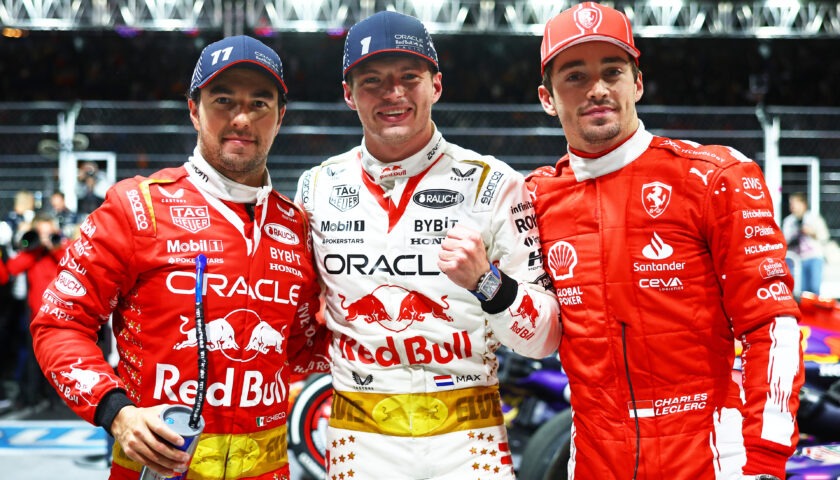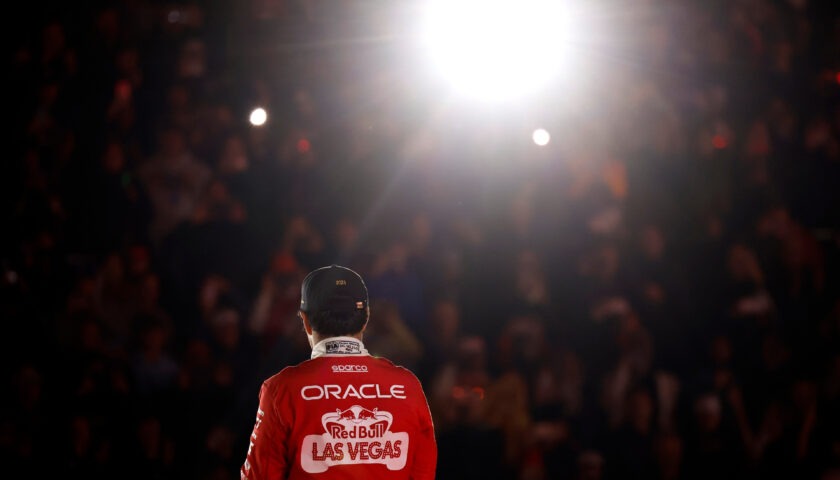Max Verstappen’s criticism, labeling it “1% sporting event,” and his unique victory anthem framed the recent Formula 1 Grand Prix in Las Vegas, resembling a Super Bowl spectacle.

Opinions on the new Grand Prix weekend were polarised, but the Hunger-Game-style duels unfolded in true world-class fashion, echoing the timeless motorsport saying: “Let the racing do the talking.”
Yet, narratives like “Verstappen wins” and “Leclerc loses from pole” lacked excitement. In contrast, Sergio “Checo” Perez, with a nonchalant demeanor, reverted to basics, yielding solid results in the last four races from Austin to Vegas, which is truly intriguing.
If the glass were half-empty, Perez then narrowly missed the runner-up spot against Charles Leclerc by 0.171 seconds in the Stripe. In the preceding Interlagos, the 33-year-old fell short by 0.053 seconds, missing the podium as Fernando Alonso beat him at the line. Before Brazil, the Mexican had a stellar start at his home race, but it only lasted a straight, concluding with a mega crash at Turn 1.
On the flip side, as this column pondered after the Mexico City Grand Prix: “If Checo hadn’t maintained a commanding 39-point lead over the British driver (Lewis Hamilton) before the Mexican Grand Prix, would he have taken the same audacious gamble?
“Was Checo’s home race mishap a reckless venture or a calculated risk gone awry?”
Then at Interlagos, yes, Perez faced a narrow loss but crucially gained 12 points, leading overall runner-up rival Hamilton by 32 points, more than a race’s worth. In Sin City, he again narrowly lost but finished ahead of his runner-up rival.
Perez’s season-end goal is straightforward: beat Hamilton and claim the runner-up spot. The 14-season F1 veteran employed varied strategies, launching attacks or assuming a defensive stance based on relevant risk-reward ratios. The father of four again consistently demonstrated an ability to grasp the broader perspective while maximising every smaller battle.
Result? He clinched the overall runner-up position before Abu Dhabi, propelling Red Bull to historic heights with a one-two finish in the drivers’ championship, surpassing milestones set during the Sebastian Vettel and Mark Webber era.
The looming question: How will Perez handle the pressure if he challenges for the world championship title in 2024?
This season began calmly. But after four races, with Perez and Verstappen each securing two wins, Checo saw the chance for a world title. Hopes rose. Then, at the Miami street circuit in the fifth race, despite starting from pole position, Verstappen, rising from ninth to victory, defeated him. Red Bull team principal Christian Horner deemed this the turning point, describing Perez’s miss as an “open goal”. Emotional setbacks sort of followed, with five races missing Q3 as Verstappen subsequently secured 10 consecutive wins, inflicting genuine “physical damage”.
For Perez to rise again in 2024, the challenge lies in how he perceives title hopes. Will the adjustment be briefer? Will it lessen in intensity? Might mid-season goals shift with his contract expiring next winter?
Lately, Checo’s performance has been finely tuned. Yet, akin to the season’s beginning, it is a phase of relatively lower pressure. If he upholds the strategic brilliance in prolonged high-stakes dramas in 2024, he will mount a challenge against Verstappen for the world title. Or will he not?









